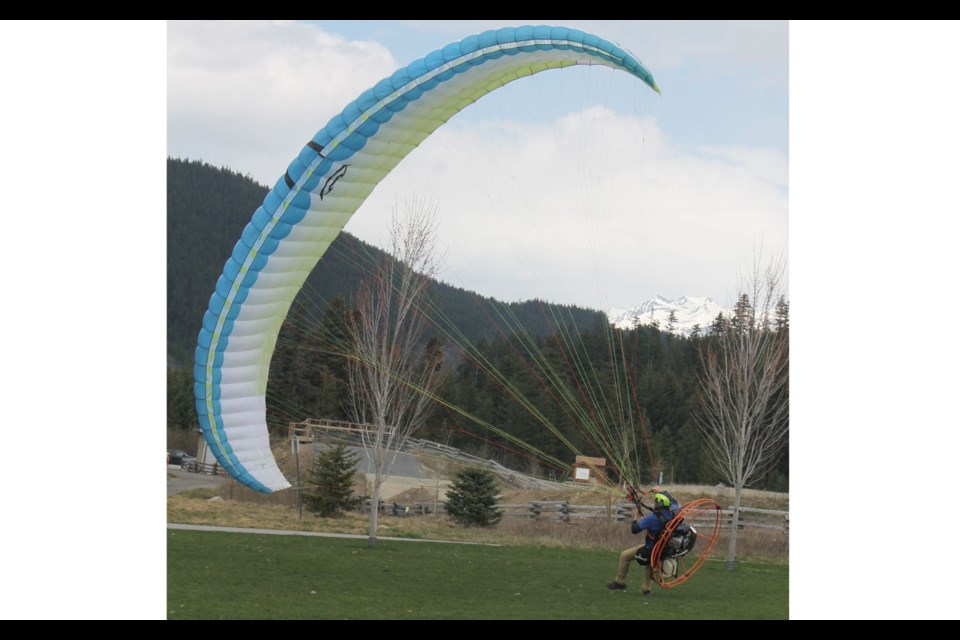When Whistler's Don Eagleton first learned about para-motoring, he went all out.
In fact, he went all the way to Southeast Asia to get his start.
Chatting about his relatively new pastime on a windy day in Bayly Park last week, Eagleton said he had injured himself while skiing and was searching for a new activity. He initially thought of ultra-light airplanes, given both Pemberton and Squamish have airports, but he soon found para-motoring, in which participants wear a roughly 27-kilogram (60-pound) fan-like device on their backs while floating using a parachute, or wing.
"The doctors said I needed to get a prosthetic shoulder. I started by thinking, 'I can't ski anymore. I can't dirt bike. I can't snowmobile. I can't do any of these things, so I need a low-impact sport,'" recalled Eagleton, who has lived in Whistler for 34 years. "I saw (a video of) a guy in Thailand running towards the water off a beach and I thought, 'What is this guy doing?' ... It was like he was on a magic carpet floating across the water. Then he went up and over the water.
"It was killing me, the anticipation to see what he was actually using. Then I thought I want to try this. As it panned out, he was flying a para-motor."
Moments later, Eagleton recalled, his partner walked in and she said they should consider a vacation in Thailand.
"Divine intervention," Eagleton said.
Soon after, he set off to the island of Ko Pha Ngan to track down his guru.
"I was like a private investigator. I tracked this guy down through the internet and people who had flown with him," Eagleton said, noting his Thai instructor trained the military search-and-rescue operators on para-motors, which they used instead of significantly costlier helicopters.
Though his instructor had plenty of clout in Thailand, the certification "was (only) worth the piece of paper it was written on" in Canada, and Eagleton could face a $10,000 fine if he flew without a Canadian transport licence. He connected with James Johnson of Armstrong, and with a month of training, earned his papers.
In the ensuing five years, Eagleton has had about 60 hours of flight time, split roughly evenly between Squamish, Pemberton and California, taking about 85 flights in that time.
Safety is paramount, as Eagleton triple-checks each of his wing's lines before taking off—one small entanglement could put him off course or otherwise impact his flight. He also checks in with local airports and ensures that they know he's out there.
If he's itching to go out for a flight, Eagleton said he'll start planning days in advance and only fly if his body and the weather are cooperative.
"I don't really wake up in the morning and say 'I'm flying today,'" he said. "I mentally prepare. I'll get everything ready.
"When that morning comes, everything is already ready ... It depends on whether or not the weather agrees with me."
Ultimately, it's about taking calculated risks, which Eagleton said is no different than when he was skiing or taking part in any other sport.
His best day so far came recently during an hour-long February flight at Green Lake in a rare takeoff from within Whistler, as the only suitable starting and landing points in the resort are frozen lakes in winter.
While a full tank of gas would allow flights of three-and-a-half hours, Eagleton said it is uncomfortable taking off with that much fuel and instead leaves with only about an hour's worth.
"I'll only put an hour, or an hour and a half in there, and then I'll fly around at about 2,000 feet (600 metres) until I do run out of gas. Then I come down and land with my wing," he said, adding that he carries a reserve chute in case his primary fails.
There are a handful of other pilots in the Lower Mainland, one in Squamish and one other in Whistler.
Sergio Leon had a bit of a different introduction, as he first got into para-motoring in his homeland of Spain, where it is significantly more popular, before moving to Whistler.
Leon was certified in Spain, bought his equipment and eventually brought it to Whistler. He used to skydive regularly, so he said it's a step back from that.
"It's not like that adrenaline rush like skydiving," he said. "It's more like chilling."
Compared to Spain, the weather can provide more challenges here, he said.
"The weather is not always the best," he said. "You can't fly almost every day even if you wanted to. It needs to be nice weather. The wind needs to be proper wind. It's definitely more challenging here, for sure."
However, Leon said "freedom" is appealing to him, and it's worth the additional hassles Whistler can provide.
"You can go wherever you want," he said, noting he usually takes off from Alta Lake for his 30-to-40-minute flights. "It's so beautiful."




